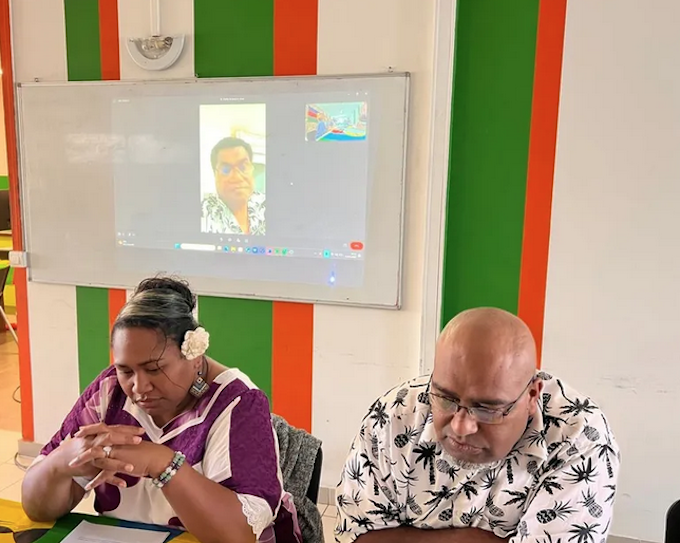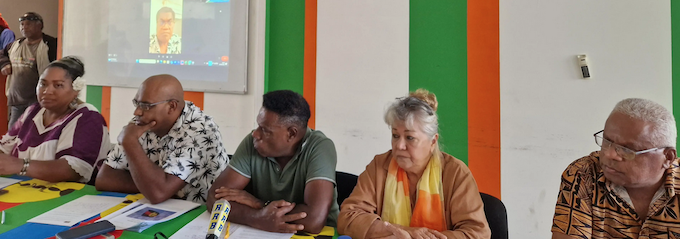
By Patrick Decloitre, RNZ Pacific correspondent French Pacific desk
New Caledonia’s pro-independence front, the FLNKS (Kanak and Socialist National Liberation Front), has formally confirmed its “block rejection” of the French-sponsored Bougival project, signed last month.
The pact has been presented as an agreement between all parties to serve as a guide for the French Pacific territory’s political future.
This follows the FLNKS’s extraordinary congress held at the weekend in Mont-Dore, near Nouméa.
- READ MORE: France’s betrayal of Kanak hopes for independence, Rainbow Warrior, climate crisis and other issues
- New Caledonia’s oldest party for independence rejects ‘Bougival’ deal
- Other Kanaky New Caledonia politics reports
Statements made yesterday confirmed the pro-independence umbrella’s unanimous rejection of the document.
At the weekend congress, FLNKS president Christian Téin (speaking via telephone from mainland France), had called on FLNKS to “clearly and unequivocally” reject the Bougival document.
He said the document demonstrated “the administrating power’s [France] contempt towards our struggle for recognition as the colonised people”.
However, he called on the FLNKS to “remain open to dialogue”, but only focusing on ways to obtain “full sovereignty” after bilateral talks only with the French State, and no longer with the opposing local political parties (who want New Caledonia to remain a part of France).
He mentioned deadlines such as 24 September 2025 and eventually before the end of President Macron’s mandate in April 2027, when French presidential elections are scheduled to take place.

Téin was also part of the August 13 media conference, joining via videoconference, to confirm the FLNKS resolutions made at the weekend.
Apart from reiterating its calendar of events, the FLNKS, in its final document, endorsed the “total and unambiguous rejection” of the French-sponsored document because it was “incompatible” with the right to self-determination and bore a “logic of recolonisation” on the part of France.
The document, labelled “motion of general policy”, also demands that as a result of the rejection of the Bougival document, and since the previous 1998 Nouméa Accord remains in force, provincial elections previously scheduled for no later than November 2025 should now be maintained.
Under the Bougival format, the provincial elections were to be postponed once again to mid-2026.
“This will be a good opportunity to verify the legitimacy of those people who want to discuss the future of the country,” FLNKS member Sylvain Pabouty (head of Dynamique Unitaire Sud-DUS) told reporters.

Five FLNKS negotiators demoted
As for the five negotiators who initially put their signatures on the document on behalf of FLNKS (including chief negotiator and Union Calédonienne chair Emmanuel Tjibaou), they have been de-missioned and their mandate withdrawn.
“Let this be clear to everyone. This is a block rejection of all that is related to the Bougival project,” FLNKS political bureau member and leader of the Labour party Marie-Pierre Goyetche told local reporters.
“Bougival is behind us, end of the story. The fundamental aim is for our country to access full sovereignty and independence through a decolonisation process within the framework of international law, including the right of the peoples for self-determination.”
She said that the FLNKS would refuse to engage in any aspect of the Bougival document.
Part of this further Bougival engagement is a “drafting committee” suggested by French Minister for Overseas Manuel Valls aimed at coordinating all documents (including necessary bills, legal and constitutional texts) related to the general agreement signed in July.
Anticipating the FLNKS decision, Minister Valls has already announced he will travel to New Caledonia next week to pursue talks and further “clarify” the spirit of the negotiations that led to the signing.
He said he would not give up and that a failure to go along with the agreed document would be “everyone’s failure”.
The Bougival document envisages a path to more autonomy for New Caledonia, including transferring more powers (such as foreign affairs) from France.
It also proposes to augment its status by creating a “state” of New Caledonia and creating dual French/New Caledonia citizenship.
Still want to talk, but with France only
The FLNKS stressed it still wanted to talk to Valls, albeit on their own terms, especially when Valls visits New Caledonia next week.
However, according to the FLNKS motion, this would mean only on one-to-one format (no longer inclusively with the local pro-France parties), with United Nations “technical assistance” and “under the supervision” of the FLNKS president.
The only discussion subjects would then be related to a path to “full sovereignty” and further talks would only take place in New Caledonia.
As for the timeline, the FLNKS motion states that a “Kanaky Agreement” should be signed before September 24, which would open a transitional period to full sovereignty not later than April 2027, in other words “before [French] presidential elections”.
Goyetche also stressed that the FLNKS motion was warning France against “any new attempt to force its way”, as was the case in the days preceding 13 May 2024.
This is when a vote in Parliament to amend the French constitution and change the rules of eligibility for voters at New Caledonia’s local provincial elections triggered deadly and destructive riots that killed 14 people and caused damage worth more than 2 billion euros (NZ$3.8 billion) due to arson and looting.
“It seems as if the French government wants to go through the same hardships again”, Téin was heard saying through his telephone call at the Wednesday conference.
“Don’t make the same mistake again,” Pabouty warned Valls.
In his message posted on social networks on Sunday (August 10), the French minister had blamed those who “refuse the agreement” and who “choose confrontation and let the situation rot”.
Reactivate the mobilisation
At the same media conference yesterday, FLNKS officials also called on “all of pro-independence forces to do all in their power to peacefully stop the [French] state’s agenda as agreed in Bougival”.
The FLNKS text, as released yesterday, also “reaffirms that FLNKS remains the only legitimate representative of the Kanak people, to carry its inalienable right to self-determination”.
FLNKS recent changes
Téin is the leader of the CCAT (field action coordinating cell), a group set up by Union Calédonienne late in 2023 to protest against the proposed French constitutional amendment to alter voters’ rules of eligibility at local elections.
The protests mainly stemmed from the perception that if the new rules were to come into force, the indigenous Kanaks would find themselves a minority in their own country.
Téin was arrested in June 2024 and was charged for a number of crime-related offences, as well as his alleged involvement in the May 2024 riots.
He was released from jail mid-June 2025 pending his trial and under the condition that he does not return to New Caledonia for the time being.
However, from his prison cell in Mulhouse (northeastern France), Téin was elected president of the FLNKS in absentia in late August 2024.
At the same time, CCAT was admitted as one of the new components of FLNKS, just like a number of other organisations such as the trade union USTKE, the Labour party, and other smaller pro-independence movement groups.
Some groups have joined, others have left
Also late August 2024, in a de facto split, the two main moderate pillars of FLNKS — UPM and PALIKA — distanced themselves from the pro-independence UC-dominated platform.
They asked their supporters to stay away from the riot-related violence, which destroyed hundreds of local businesses and cost thousands of jobs.
UPM and PALIKA did not take part in the latest FLNKS meeting at the weekend.
The two moderate pro-independence parties are part of the political groups who also signed the Bougival document and pledged to uphold it, as it is formulated, and keep the “Bougival spirit” in further talks.
The other groups, apart from UPM and PALIKA, are pro-France (Les Loyalistes, Rassemblement-LR, Calédonie Ensemble, and the Wallisian-based Eveil Océanien.
The FLNKS, even though five of their negotiators had also signed the document, has since denounced them and said their representatives had “no mandate” to do sign up.
Reaction from two main pro-France parties
Pro-France parties had carefully chosen not to comment on the latest FLNKS moves until they were made public. However, the formal rejection was met by a joint communiqué from Les Loyalistes and Rassemblement-LR.
In a long-winded text, the two outspoken pro-France parties “deplored” what they termed “yet another betrayal”.
They confirmed they would meet Valls along Bougival lines when he visits next week and are now calling on a “bipartisan” committee of those supporting the Bougival text, including parties from all sides, as well as members of the civil society and “experts”.
They maintain that the Bougival document is “the only viable way to pull New Caledonia out of the critical situation in which it finds itself” and the “political balances” it contains “cannot be put into question”.
This article is republished under a community partnership agreement with RNZ.














































